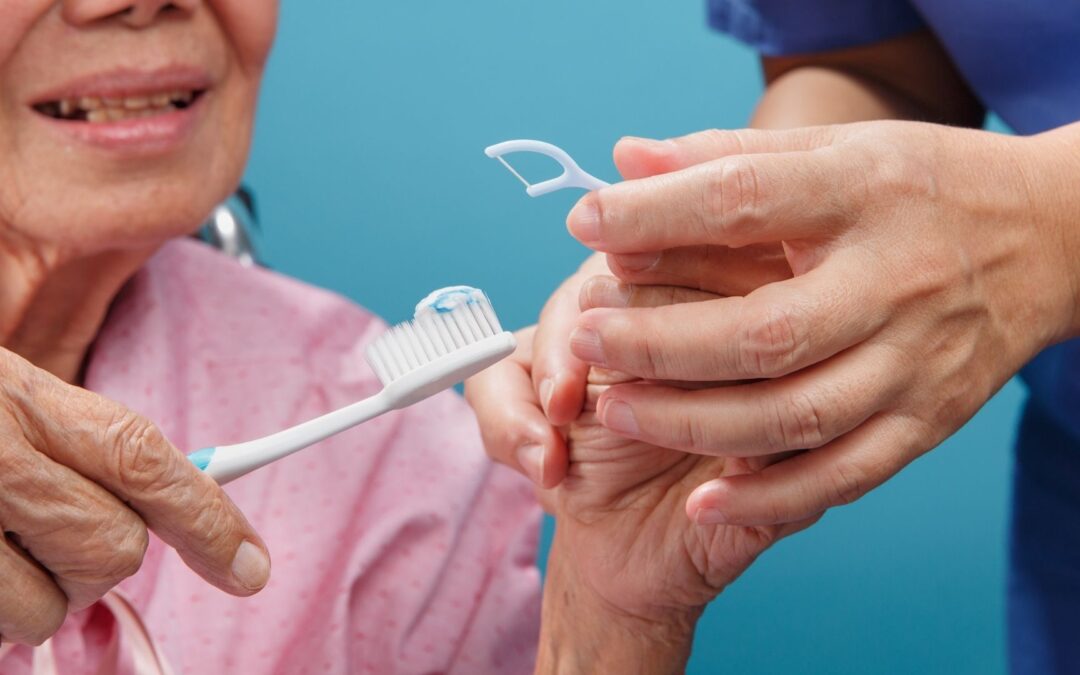There are 44 million family caregivers in the United States. When you are the caregiver for your loved one, there is a lot you have on your mind. Doctor’s appointments, medication, nutrition, and daily comfort may all seem more urgent than oral health. However, oral health should be an important part of your regular care.
It Is Important
Oral health impacts many other areas of your loved one’s health and wellness. If the mouth and teeth are not kept clean it often leads to sensitivity and pain. Teeth that are not cared for can also become infected and spread infection to other parts of the body. Broken teeth or damaged partials or dentures can be sharp and dangerous. They may even pose a choking hazard. When teeth are sensitive and painful, a patient has trouble eating. This will impact their nutrition and overall wellness. Healthy teeth impact a patient’s overall comfort, safety, and self-esteem. Caregivers quickly realize how important oral health is for patients.
When you’re caring for someone who is confined to bed, they may have so many health problems that it’s easy to forget about oral health. However, it’s still very important because bacteria from the mouth can be inhaled into the lungs and cause pneumonia.
Patients Need Help From Caregivers
If you are a caregiver, you know that your loved one may need help with their oral care. Some conditions may make it difficult to hold a toothbrush. Memory challenges or dementia can make it hard to remember to brush and care for their mouth. They may be unable to remember to schedule, to be able to schedule, or to be able to get to regular dental appointments. It is up to those who provide patient care to include oral health in that treatment plan.
Oral Health Steps
- If your loved one can handle basic care themselves, let them do so. Talk to them about their routine and monitor to be sure they can successfully care for their mouth.
- Be sure the patient or a caregiver brushes the teeth twice a day for 2 minutes using a fluoride toothpaste.
- If you are brushing for them, examine the mouth and be observant of any problems that may be starting so that they can be addressed early.
- Be sure the patient or a caregiver floss with dental floss, a pick, or a water flosser each day.
- Use a fluoride rinse or gel each day to provide additional protection.
- If your loved one has dentures or partials, they should be rinsed after meals.
- Clean dentures daily with a soft denture brush and a denture cleaner.
- Keep dentures in water overnight.
- Limit unhealthy snacking and sugary drinks. Proper nutrition is important for the body and for oral care.
- Be aware of symptoms that can relate to a larger issue. Some medications can cause dry mouth. Some can cause painful thrush, a yeast-like fungus in the mouth.
- If your loved one complains of dry mouth, try sipping water, ice chips, or there are several over the counter mouth rinses that may help. A humidifier is another option to help with dry mouth, especially during sleep.
- Be sure your loved one sees a dentist regularly, even if they wear dentures or partials.
Tips for Caregivers
Ideally, we would like our loved ones to have the ability and confidence to care for their own oral health. There are some things you can do as a caregiver to make these daily tasks easier. For toothbrushing, be sure that the patient has a new soft bristle brush at least every 3 months. It is also a good idea to get a new toothbrush after an illness.
Brushing Teeth
For some patients the toothbrush is hard to manage physically. There are things caregivers can do to make it easier to handle.
- Attach a Velcro or an Elastic strap to the toothbrush that goes around the hand and holds the brush to the hand.
- Another option to make the toothbrush handle easier to grip is by adding a tennis ball to the end, strapping a dowel rod to the handle, or even placing the handle inside a bicycle grip.
- Purchase toothbrushes with a larger handle that is easier to grip.
- A power toothbrush not only has a larger easier to hold handle but makes brushing easier.
Be sure the patient has time to get used to any modifications and is comfortable. Finally, you can gently place your hand over their hand and gently guide their movements.
Flossing
Flossing can be difficult, even for those that do not have any dexterity challenges! There are things that can help. Flossers that hold the floss for you makes It easier. There are special periodontal toothpicks made specially to help clean between teeth. A water pick is also an option.
If you do need to help your patient brush and floss, it is easier for you if you stand behind them when they are sitting in a chair. Place one hand around the head on one shoulder, letting their head tilt and rest gently on your arm. Of course, be sure to talk to your patient first and explain what is going to happen and get their permission.
The care you give your loved one is important. Be sure your care includes regular oral care and regular dental visits. Professional cleanings and regular examinations identify problems early and avoid larger problems from developing. At Danville Family Dentistry we help you take the best care of your loved one’s oral health. Contact us today!
Are you on Facebook? We are, too! Let’s be friends!
Disclaimer: The information included in this article is for educational purposes only. It should not be used as a substitute for professional medical advice, diagnosis or treatment.


 (317) 745-4400
(317) 745-4400 info@danvilledentalcare.com
info@danvilledentalcare.com